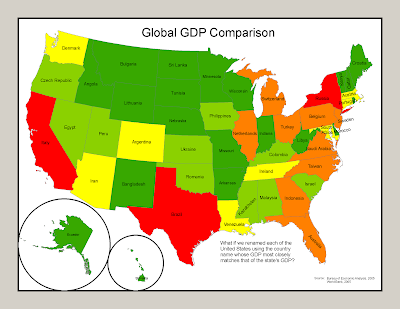In geography, we talk about
devolution.
Devolution is the breakdown of a state [country/nation] due to internal division. Some other terms that are also associated with devolution are
Balkanization,
Shatterbelt, and
Failing/Failed States. When people within a region, whether that region be a state, nation, or realm, become disenfranchised with their government or method of governance, conditions are ripe for devolution.
The United States is embroiled in a process of
nation-building in Iraq. We are encouraging Iraqi people to reduce their cultural ties to their tribes or larger family units and increase their identification with the greater Iraqi state. However, admirable this action might seem, the United States has not proven to be the Great Unifier.
I begin my argument by submitting that the current state of U.S. affairs in Southwest Asia can be traced to
1953. In reality, the creation of the state of Israel might be the birth of the modern era of conflict in Southwest Asia. I choose 1953 as my baseline due to the U.S. support of the Iranian Coup that overthrew the democratically-elected government of Mohammed Mossadeq. The British petroleum company, BP, was the private oil industry in Iran at the time. The Iranians, weary of seeing their oil and oil profits siphoned off to the West, nationalized the oil industry. The West, namely the United States and Great Britain, saw this as a threat.
Operation Ajax was born out of the desire to regain control of oil resources in Iran.
Eventually, this would lead to the overthrow of the Shah of Iran, Reza Pahlavi, in 1979, beginning the theocratic rule still in place today.
Let us not forget that Iran was once Persia, which was once the Persian Empire, and is a nation and a people whose history pre-dates that of any European nation.
In
1982, the United States threw their support behind Saddam Hussein in
his war 8-yr war against Iran. At that time, the war was turning against Iraq, and the U.S. did not think that it was in its interests for Iraq to lose.
In the meantime, during the decade of the
1980's, the United States cast its lot with the Muslim Afghan rebels in Afghanistan. The effort to help the Afghans against the Soviet march resulted in the most
successful covert action in the history of the CIA. We also helped train those we are at war with now, in Afghanistan, and Pakistan.
In
1990, two years after its war with Iran, Iraq found itself at war with its former weapons supplier, the United States.
In
2002, the United States instituted a policy of regime change in Afghanistan, a nation that we were the benefactor of for almost a decade.
In
2003, the United States implemented regime change within Iraq. The coup in Iran in 1953 might also be termed, "regime change."
Currently, the United States has engaged both Syria and Iran in helping resolve conflict within Iraq. Both Syria and Iran have been marginalized through the "Axis of Evil" label. Both the United States and Iran have engaged in finger-pointing - "You're responsible for making this worse!"
Iran is being accused of providing more sophisticated IEDs and other weapons to Iraqi insurgents. In April
2007,
ABC News ran a story about our secret efforts in Iran.
Lebanon had parliamentary elections the other day. A predominantly Muslim nation, but with sizable Christian and Armenian minority populations, by the way. The candidate supported by the United States - lost. The former president, Amin Gemayel was trying to win the seat vacated by his son. Analysts believe that the support by the Bush Administration doomed his election.
In closing, I offer this. Destabilization of this region cannot be attributed to any single nation. Russia, China, France, Great Britain, the United States, Iran, Israel, Egypt, Saudi Arabia, Libya - who am I leaving out? - are all responsible. Destabilization may have a core cause: Oil.
One thought I do have is this: discounting Oil, the basis for this destabilization is founded on the
inherent disrespect that nations have for each other. Nations, and administrators of those nations, lack fundamental respect for differences among themselves, the people they government, and the lives in the far-flung reaches of our global that their policies directly or indirectly affect.

